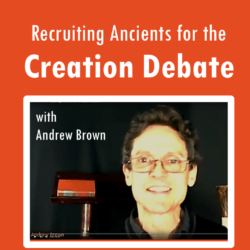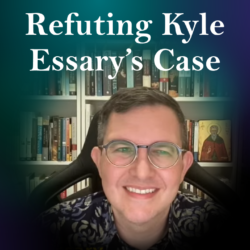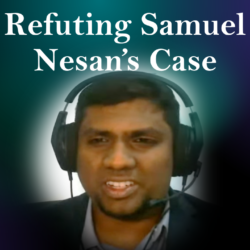This is part 6 of the Calvinism Debate

Can you lose your salvation? If God saves someone, will they always persevere? What about people who leave the church? These are important questions and they are at the heart of this last discussion on Calvinism. Blake affirms that after regeneration, absolutely nothing can separate someone from God’s saving love. Jacob denies “once save always saved,” putting forward instead that the warning passages in the bible make the most sense if someone can actually fall away.
What Position Do You Think Won the Day?
- Perseverance of the Saints (Blake) (80%, 12 Votes)
- The Saved Can Fall Away (Jacob) (20%, 3 Votes)
Total Voters: 15
—— Links ——
- Check out the other posts in this Calvinism debate here
- More info about Jacob and Blake here
- See Jacob Roher’s interview on the gospel or watch his sermon, “How to Treat Other Christians.” His email is thekingdomgospel@outlook.com
- See Blake Cortright’s podcast on spiritual disciplines as well as how to quit pornography. Follow him on Twitter @blakecortright
- Intro music: Jazzy Frenchy by bensound.com. Licensed under Creative Commons: By Attribution 3.0 License.







Blake kept misquoting 1 John 2:19, that those who went out were NEVER of us. The text says “they were not of us” which could just as well mean that they were NO LONGER of us i.e. at some point after their conversion they strayed from the truth and their going out made that manifest.
Great point! Words and their actual meanings matter! Like the way trinitarians quote psalm 110 and keep saying adonai is adoni (the Lord God vs. lord).
Blake, you are taking Philippians 1:6 out of context. “And I am sure of this, that he who began a good work in you will bring it to completion at the day of Jesus Christ”. Please go back to verse 1 and read that this is a letter addressed “To all the saints in Christ Jesus who are at Philippi, with the overseers and deacons.” This means that the “you” of verse 6 is the church at Philippi, not an individual person. God had begun a good work with this church (financing the spread of the gospel to the Gentiles) and Paul tells them that this good work will continue until the day Jesus returns. The perseverance, if you want to call it that, applies to the work that God was doing, beginning with them. It should not to be misconstrued to be a guaranteed individualistic perseverance.
I found Blake’s comments towards the end the most telling. When asked if he had assurance of his salvation, all he could say “I think so.” He has no more confidence of his salvation than Jacob, possibly less.
Why? Because even if Calvinism is true, none of us were there when God supposedly decided to elect some, so we have no idea if we are part of the cut.
The reality is that Blake’s position is less assured that Jacob’s. He could do all the right things, believe the right things, etc. but ultimately, he has nothing to stand on if God, in his sovereignty didn’t choose him.
Also, katabolē kosmos Doesn’t mean foundation of the world. It drives me nuts when Calvinists use it that way.
In English we have the term catabolism, which means to break living molecules down. Then we have cosmos, which I don’t think anyone thinks means world, but it does mean the harmonious order, the movement of objects in relationship to each other, etc.
We have no references to God Making decisions about things before the creation, except supposedly, these couple of passages in the N.T.
It seems more likely that this phrase is being used in reference to Gen. 3. Before God threw down the system and order he had established (eating from the tree of life to continue living) by pushing them out of the Garden, he made a promise to Eve that one of her descendants would crush the serpents head.
In other words, he made a plan of salvation for all men before he threw down the system he established in the Garden, not that he picked individuals before he created the World.
Another thought I keep returning to: 2 Pet 3:9. God is patient because he desires all to attain to repentance. If he really wants ALL to repent, he could make them. But he patiently waits and hopes people will. This is free will. As is persevering and repenting. The idea that the 1 lost sheep and 99 not lost doesn’t fit a believer who purposely leaves the faith by choice. A lost sheep is trying to find its way back to the shepherd and get home. That’s very different than a sheep that demands its inheritance and leaves on its own, with no intent to return home. That sheep isn’t “lost.” God searches for the lost to draw them to him and bring them into the fold. But once they are in, they have to choose to stay in. Otherwise we have no free will.